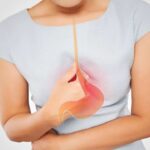Facing thyroid cancer, maintaining a healthy and appropriate diet can support the patient’s health while enhancing the effectiveness of the treatment process. So, what should thyroid cancer patients eat, and how dangerous is this condition? Let’s explore with Thu Cuc TCI.
1. What is Thyroid Cancer?
Thyroid cancer is a condition in which the normal cells in the thyroid undergo transformations, deviating from the body’s natural control and developing abnormally. There are various forms of this disease, including papillary, medullary, and anaplastic. Medullary, and anaplastic thyroid cancer often have poorer prognosis compared to others, while the differentiated type shows a very positive prognosis.

Differentiated thyroid cancer
2. Factors Contributing to Thyroid Cancer
This is a dangerous condition originating from various factors. Understanding these causes helps in self-protection and minimizes the risk of contracting this serious disease:
2.1. Immune system disorders
When the immune system is compromised, it loses the ability to control the abnormal cell growth in the thyroid gland.
2.2. Radiation exposure
Exposure to radiation, whether for medical treatment or through ingestion or inhalation, can increase the risk of thyroid cancer.
2.3. Genetic factors
Individuals with a family history of thyroid cancer are at a higher risk. Genetics account for about 70% of cases.
2.4. Age and hormonal changes
Between the ages of 30-50, hormonal factors in women pose a risk. Women, especially during pregnancy and postpartum, are at higher risk.
2.5. Thyroid diseases
Goiter, Graves’ disease, or issues related to thyroid hormones can increase the risk.
2.6. Unhealthy habits
Unhealthy eating habits such as excessive stimulant intake, late-night eating, stress, and sedentary lifestyles can increase the risk.
2.7. Iodine deficiency
Lack of iodine in the diet can contribute to the risk of this condition.

Iodine deficiency can be a factor contributing to causing thyroid cancer
3. Symptoms of Thyroid Cancer
In the early stages, the disease often doesn’t manifest obvious symptoms, but when it does, there are signs to watch out for, such as:
- The first sign is a palpable lump in the neck area.
- Pressure on the vocal cords from the affected thyroid gland can cause hoarseness.
- Difficulty swallowing or breathing may result from pressure on the esophagus or trachea.
- In later stages, lymph node swelling may occur, indicating the spread of cancer.
- If thyroid cancer has spread to the bones, bone pain may be experienced.
These symptoms may not only indicate thyroid cancer but also other conditions. Therefore, if you experience any unusual signs or symptoms, especially in the neck area, it’s advisable to consult a doctor for a thorough evaluation. Early detection will improve treatment effectiveness and prognosis significantly.
4. What Should Thyroid Cancer Patients Eat?
The diet of patients should be advised by a specialist to meet their nutritional needs and address any challenges they may face after treatment. Below are some dietary recommendations for thyroid cancer patients, answering the question of what to eat:
4.1. Soft and liquid diet
Foods should be prepared to be easy to chew and swallow, reducing pressure on the mouth and throat mucosa. Soft, liquid foods such as soups, porridge, and pureed foods are good choices.

Foods should be prepared to be easy to chew and swallow
4.2. Calorie-protein-rich foods
Choose foods like fish, poultry, soybeans, and dairy products to ensure an adequate supply of calories and protein for the patient’s body to recover. Meals should be divided into smaller portions to enhance digestion and nutrient absorption.
4.3. Hot or cold foods
Patients can choose between hot or cold foods depending on personal preferences and comfort. However, hot foods may sometimes have a stronger odor and trigger nausea, so cold foods may be a better option. When experiencing nausea, patients should avoid fatty foods and spicy foods.
4.4. Nutritional supplements
If a normal diet does not meet nutritional needs, patients should supplement with oral nutritional supplements (ONS). ONS products can provide a consistent source of calories, protein, and nutrients that are easy to consume.
4.5. Artificial nutrition
Artificial nutrition menus should be applied when necessary to ensure an adequate supply of energy and nutrients.
Thyroid cancer patients need to monitor their weight and have appropriate nutritional needs. Dietary changes will depend on the body’s response and guidance from a specialist. Each person’s body reacts differently, so dietary adjustments should be made based on the specific health status of each patient. Always discuss with a doctor to have a suitable dietary plan, ensuring adequate nutrition.
These are the answers to the question of what thyroid cancer patients should eat. If you have any symptoms related to thyroid cancer or if you have a high risk factor, you should visit a doctor for appropriate examination and diagnosis. Early detection significantly improves treatment and prognosis. Protect your health by maintaining a healthy lifestyle and regular health check-ups.








